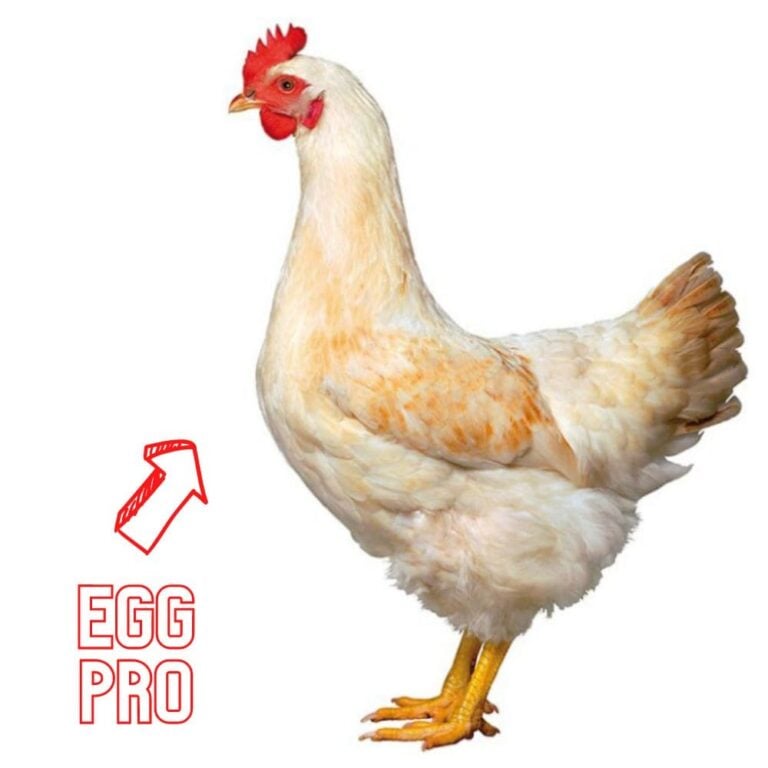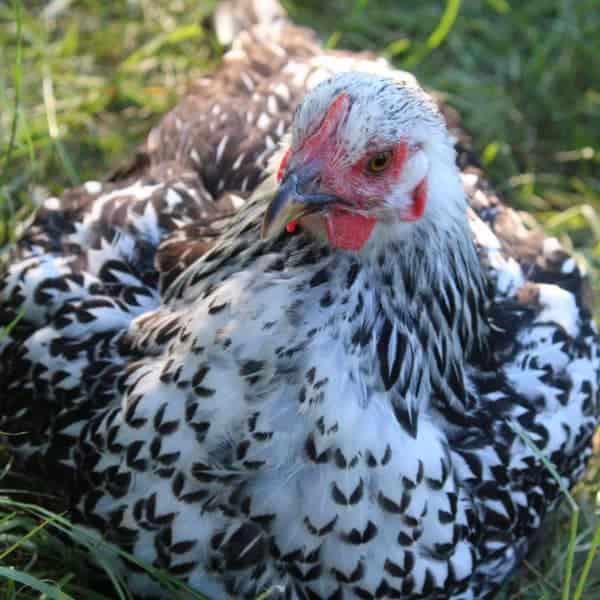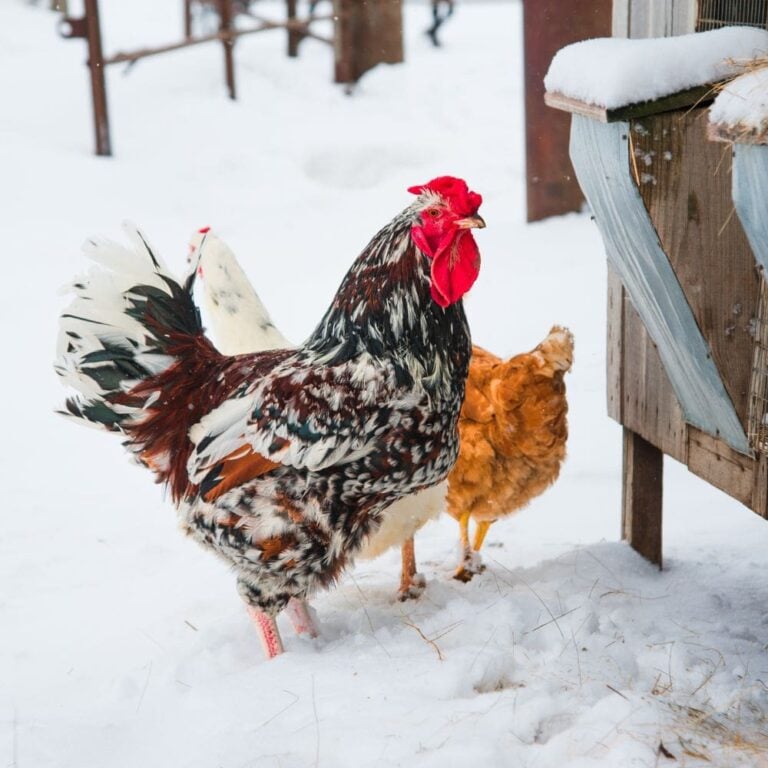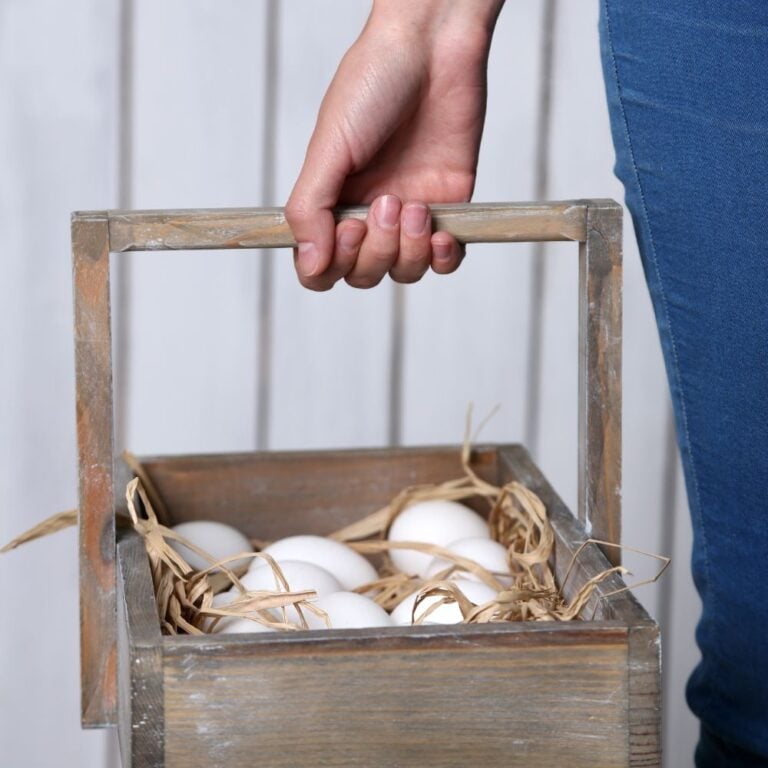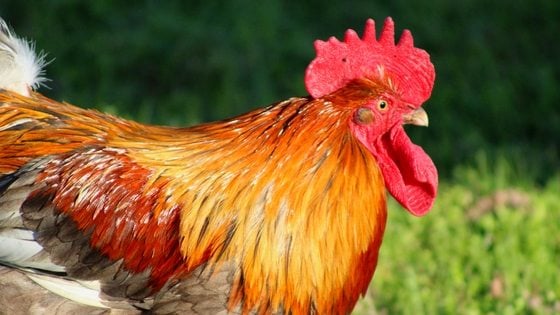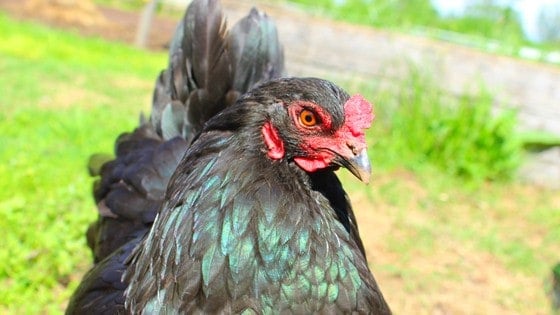Can chickens eat grapes? Come along and find out this, and more chicken food myths and facts that every chicken owner needs to know.
Most people know what their pet dogs can and can’t eat…”Don’t feed the dog chocolate! It’s toxic!” But what about your precious chicken flock? They are just as much people as your dogs are, in my opinion. 😉💕
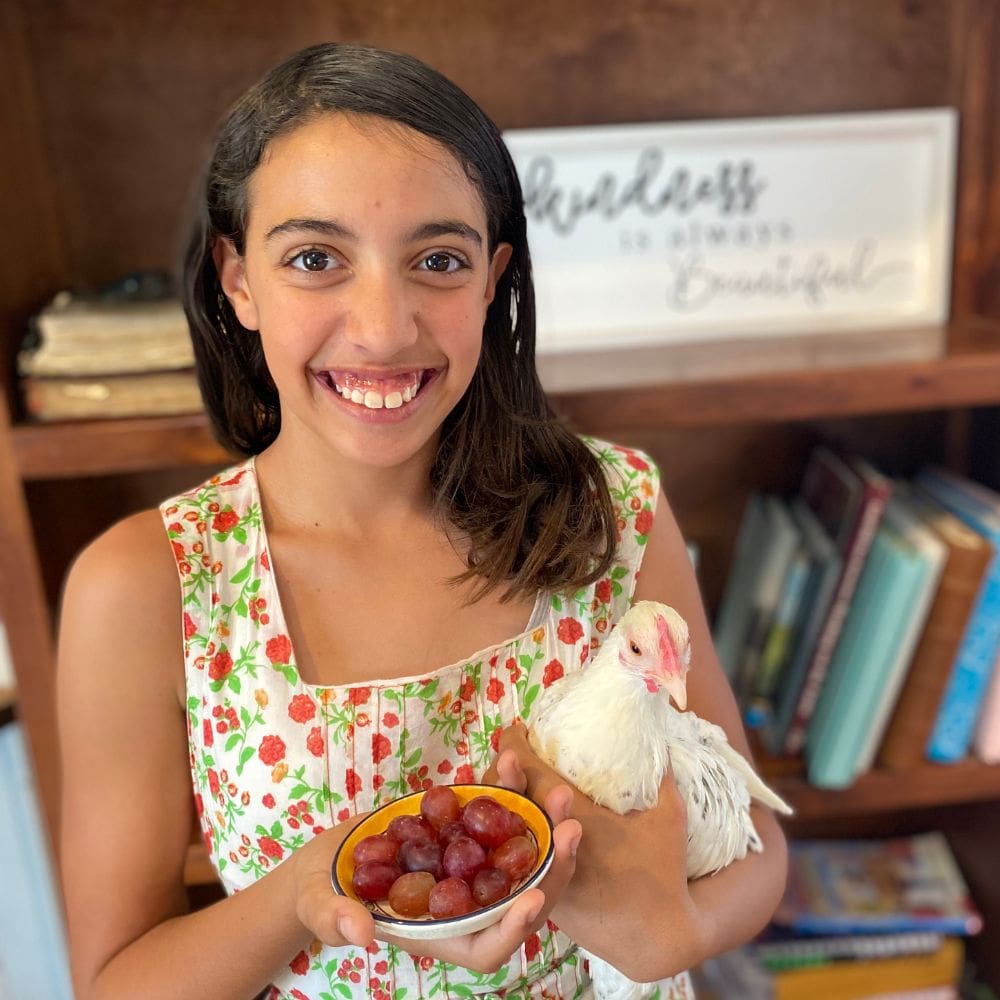
If you are reading this, then you probably want to know: Can my chickens eat grapes? The quick answer is yes, in moderation. I’ll cover that in this post, but hopefully, this has made you think beyond grapes because there are things that aren’t safe for chickens to eat – and every chicken owner needs to be sure they know!
We will go over a variety of foods briefly. I will tell you upfront that I am not a chicken vet or a medical professional. Please do your own due diligence in regard to feeding your pets, including your backyard flock!
Table of Contents (Quickly Jump To Information)
Apples
An apple a day keeps the…..Vet away??? Who knows? But we do know that chickens can eat apples and they love them. You might be careful with apple seeds as they contain cyanide. I know some people who do not avoid apple seeds and some who avoid them like the plague.
As for chickens, they don’t seem to mind apple seeds. But just because they don’t mind doesn’t mean they aren’t poison for them.
Be sure to wash your apples really well, both for you and your chickens, as they may have pesticides on the outer layer.
Avocados
You might find some websites that say it’s ok for a chicken to eat SOME parts of an avocado. This is a myth. Avocados contain a compound called persin, and it’s a toxic substance to chickens (and other animals). There are claims that persin is only in the skin and pits – so if you carefully feed them ONLY the fruit, it’s okay and even nutritious. As far as I can tell this is NOT TRUE.
According to the Merck Veterinary Manual, even the fruit is toxic to birds. See for yourself:
Avocado toxicosis occurs after ingestion of fruit, stems, leaves, or seeds of the avocado plant. Clinical effects include sterile mastitis in lactating mammals and myocardial necrosis in susceptible mammals and birds.
Ingestion of avocado (Persea americana) has been associated with development of myocardial necrosis in mammals and birds and with sterile mastitis in lactating mammals. Cattle, goats, horses, mice, rabbits, guinea pigs, rats, sheep, budgerigars, canaries, cockatiels, ostriches, chickens, turkeys, and fish are susceptible to these conditions after avocado ingestion.
Merck Vetrinary Manual Website
If Merck isn’t convincing enough, you can also check out the Poultry DVM website and its run down of chickens and avocados (hint: it’s on their list of toxic plants for chickens).
Yikes, it’s amazing that avocados are so healthful to humans but toxic to many of our pets. Based on Merck, I wouldn’t chance feeding even a speck of avocados to my precious flock.
Bananas
Yes, it’s a fact! Chickens can eat bananas. Not only can they eat the inside, but they can also eat the peels. They do contain a high level of natural sugar though, so they should only eat bananas in moderation lest they become plus-size chickens (and have related health issues).
Bananas contain many healthful nutrients, all the way from potassium to B6, vitamin C, and magnesium. It’s like a multivitamin gummy for your flock!
Bread
Chickens can eat bread, but it should be just a treat and it should definitely not be moldy. Too much bread can alter their microbiome and cause an overload of bad bacteria in their crop and gizzard. Plus bread doesn’t have much nutritional value so it’s kind of pointless.
They certainly do LOVE bread though and will eat as much as you throw at them. It’s just best to give bread snacks every now and then.
Chocolate
Thinking of giving your pretty little chickens a box of chocolates for Valentine’s Day? Unless you think diarrhea, abnormal heartbeats, seizures, and kidney failure says “I love you,” you might reconsider. It’s no myth that chocolate is bad for dogs and chickens.
Chocolate contains theobromine (a bitter compound found in cacao seeds), and this compound is toxic to many animals including fowl. Their little bodies can’t handle this compound and process it differently than humans. In addition to theobromine, chocolate also has caffeine which is toxic to birds as well.
If you love your chickens so much that you MUST get them a theobromine and caffeine-free Valentine’s Day treat, make sure it’s a nutritious one like this Valentine’s Goody Box designed specifically for chickens! Who knew such a gift existed? Not to mention, if you have a chicken loving girlfriend or wife, this would be an excellent way to earn points. 😍
Corn
Chicken can eat corn! And corn is in most chicken feeds. It has about 7.5% crude protein (on average) and is a good carbohydrate for your birds, especially in cold weather. It also has a decent amount of fiber. However, it should not be the ONLY feed given to your chickens.
They need other nutrients, such as methionine (which is an amino acid that helps make proteins) – corn is low in methionine but your chickens don’t know this (they count on you to give them proper chicken feed).
Your feathered friends can eat corn on the cob, creamed corn, cracked corn, and cooked corn. Plus they love corn…and if you give them more of what they love, then they love you more. See the cycle?
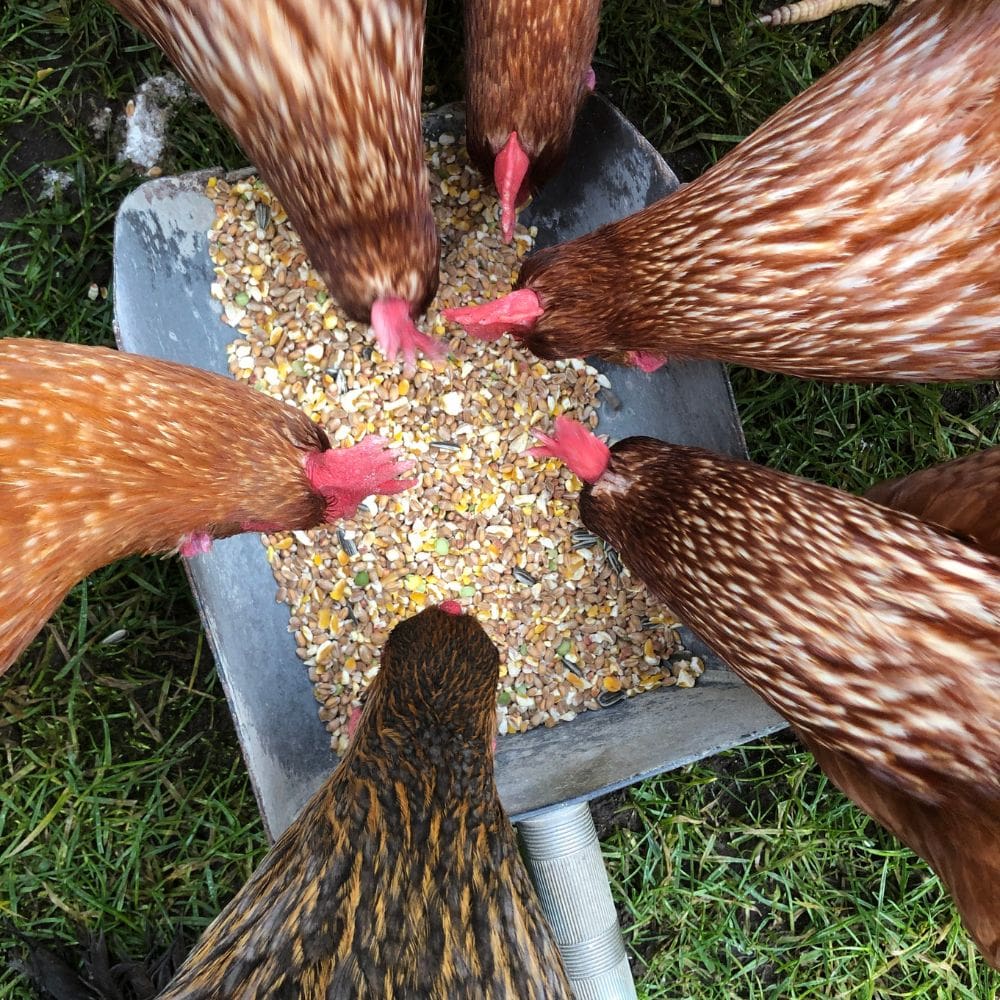
Cucumbers
It’s true that cucumbers are a good source of vitamins, such as vitamins K, B, and C, and have a high water content (which is great for hydration). And it’s also true that chickens can eat as many cucumbers as they want. Just don’t let them dip those cukes in ranch dressing. 😉
Grapes
The big question, can chickens eat grapes? Full of essential vitamins, A, C, and B, it’s no myth that chickens can eat grapes (grapes, grape leaves, grape vines, and even the stems). They are sweet and juicy and delightful to pretty much all chickens. Just be sure not to give a whole grape, rather cut them in half if you want to be extra sure your chickens won’t choke on them, especially bantams. You want to avoid a choking hazard.
They can eat red grapes, green grapes, black grapes, concord grapes, and even moon drop grapes (go ahead and click here, I know you really want to see exactly what a moon drop grape looks like). No matter the type of grape, your chickens can enjoy munching on them.
What about retired grapes? You know, the ones that are now all dry and wrinkly…otherwise known as raisins. Can they eat those? Raisins are packed full of vitamins, but mostly consist of carbs and a ton of natural sugar. So raisins should be a treat and not a daily feast.
Long story short, you should not worry about giving your chickens grapes.
Lettuce
Yes, yes, yes, and….no. All lettuce is good for backyard chickens except iceberg lettuce. Iceberg lettuce gives lettuce a bad name for many critters, like bunnies. It’s hard to believe but it’s true. It’s mostly water and has little to no nutrient value, and can cause horrible diarrhea which can lead to death if large amounts are consumed.
It’s pretty unlikely that your chickens will die with just a serving or two of iceberg lettuce, but it’s a lettuce that should be avoided. But go crazy on all the other lettuce varieties.
Mushrooms
Button, hen, chicken of the woods, oyster, or morel…it matters not – if you can eat the mushroom, so can your backyard buddy. However, since your buddy has a much smaller brain than you, I wouldn’t trust her to know what’s good to eat out in the woods. You are going to have to be brains while your hen is looking pretty.
As you probably know, mushrooms are a delicate issue when considering whether they are poisonous or not. Please be sure, or walk away.
Potatoes
It’s both a fact and a myth that chickens can eat potatoes. I know, it would be nice if it were just black or white – but it’s not. Potatoes contain a neurotoxin called solanine. However, significant amounts are only found in the green areas of potatoes. I cook my potato peels, which reduces the level of solanine, before tossing them to my tiny dinosaurs. It provides peace of mind.
That being said, before I knew anything about solanine, I fed my chickens raw potato peels fairly regularly and never had a problem. Even so, it’s important to note that potatoes are a very starchy carb and chickens won’t thrive on a lot of starchy carbs.
Pumpkin
Your chickens might have a longer life and will definitely love you more if you give them fresh pumpkins. They can eat the flesh and the seeds. And if you cut one in half and offer it to them they will pick it absolutely clean (the same is true of watermelons).
Pumpkin has a very long list of vitamins and minerals. These tasty morsels have vitamins A, B1, B6, and vitamin C, as well as calcium, magnesium, and much more.
There’s no reason NOT to add pumpkins to your chicken snack menu.
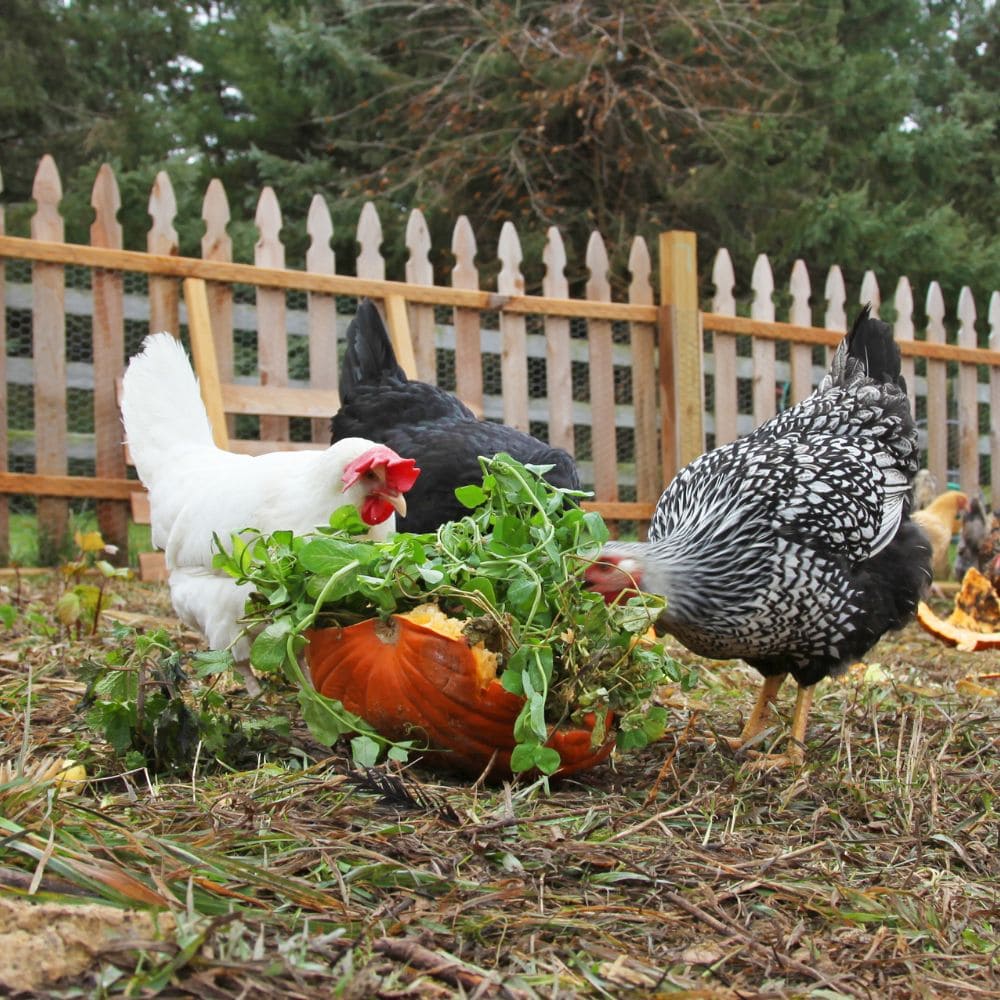
Rice
It may be one of the biggest bird food myths around, but birds CAN eat uncooked rice. This includes chickens. And NO the rice does not swell up in their bellies and cause a stomach explosion (their stomachs are not hot enoght to cook the rice and cause such a reaction).
They can eat rice cooked too. And they really enjoy rice. Rice isn’t necessarily packed full of vitamins and minerals, although it does have some.
Tomatoes
Yummy to my tummy tomatoes are a garden favorite I can happily share with my best garden buddies – my chickens. I think they love them as much, or more than I do. And they are full of antioxidants! They are super nutritious and packed full of goodness.
I gather any damaged or overripe tomatos from my garden during the summer and give them to my chickens as treats.
What About Table Scraps?
As long as you are avoiding any of the toxic foods chickens can eat table scraps. My chickens absolutely LOVE table scraps, even cooked chicken scraps 😮. It means no food waste in our home AND a happy flock!
Scraps shouldn’t be their only source of food though. They should also have a high quality feed – this one is my favorite (it’s non-GMO, has no soy fillers, and is full of nutritious goodies).
You should, however, avoid giving them a bunch of processed and/or sugary foods or condiments, like jellies and jams for example. It’s no better for them than it for us, and they are very small in comparison to us (which means more of an impact per pound).
Don’t Feed These To Your Chickens
- Uncooked beans
- Chocolate and candy
- Fruit pits (apricot, cherry, peach, pear, plum)
- Avocados
- Potato skins (or cook them)
- Apple seeds
Summary
There are a lot of sources online to find out what your chickens can and can’t eat. So be sure to do a quick search before assuming. Just remember to look at trusted sources and not just take anyone’s word for it. Your chickens are too precious to gamble with.

A happy wife, mother, teacher, writer, hobby farmer, lover of chickens, and contributor to Pampered Chicken Mama!

